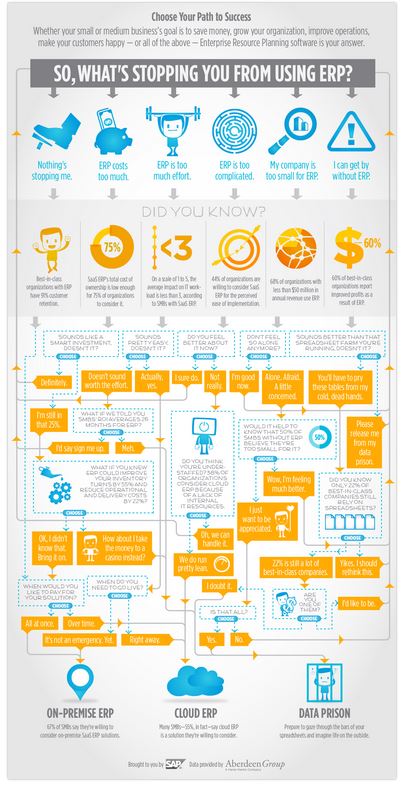5 Reasons to Consider Enterprise Resource Planning
1. Reasonable Cost
ERP Costs are lower than you might think and are a proven ROI generator for most businesses. For example, with SaaS ERP (software as a service) the total cost of ownership is low enough for 75 percent of organizations to consider it. SMBs ROI is about 26 months and ERP can improve inventory turn by approximately 55 percent while reducing operational costs by 22 percent.
2. Reasonable Effort Required
If the idea of an intensive IT project does not sound like a good idea, than you are in luck. The average workload for implementation is less than a 3 on a 5 point scale (according to an Aberdeen report). Work will be required and time is necessary for ensuring all departments know how to use the new software. However, a proper implementation partner can cottage risk and make the process seamless for your organization.
3. An ERP Implementation is Not Overly Complicated
The Aberdeen report also found that 44 percent of organizations are willing to consider SaaS ERP for its perceived ease of implementation. Organizations should heavily consider which software is the best fit, and evaluate what processes and uses they will need for their organization. Once this is done, success implementation is dependent business process modeling and proper employee training.

View the full sized infographic here.
4. ERP is Not Just for the Big Companies
About 68 percent of organizations with revenue less than $50 million use ERP. If manpower is an issue consider an implementation consider going with a consulting firm. These firms can offer daily, weekly and monthly onsite assistance. This is absolutely the best way to mitigate risk. The cost may seem to be more initially, but ultimately almost all businesses will save money with this approach.
5. Ditch the Spreadsheets
If you think you can get by without an ERP system, think again. About 60 percent of best-in-class organizations report improved profits as a result of ERP. The great part of the software is how it can often eliminate the need to rely on spreadsheets. While planning and reporting may need to use excel, all other departments can use ERP.
Spreadsheets always have a growth cap. The data trail always gets too large for an organization to properly manage manually. Additionally, the organization is always at risk when turnover occurs; as often the employee that exit leaves with all the proprietary knowledge of how the spreadsheet works.
If you have questions about what an implementation would require please reach out to us. We offer a free consultation and would be more than happy to walk you through the process.

